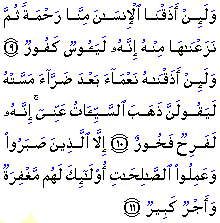Living for the Moment, Times of Adversity, Disliked Acts
Issue 235 » August 15, 2003 - Jumada-al-Thani 17, 1424
General
| Living the Quran |
Hud One of the most serious flaws in human nature is that of hastiness and impetuosity. Many human live for the moment. They attribute their past happy state to a merely accidental chain of causes and effects - in short what is commonly regarded as 'luck' - and not to God's grace. They turn to God for help and support in the face of adversity and affliction, but as soon as these are alleviated or lifted, they behave as if they had never occured - as if it was just a 'natural phenomenon'. People with patience and who do righteous deeds are the only one who are free from such shortcomings. They are patient because they know that everything God decrees for them is good. If they are bestowed with something good, they are grateful to God. Thus it is good for them. If they are afflicted with a calamity, they observe patience through repentance and remembrance of God. And that is good for them. Source: |
| Understanding the Prophet's Life |
In Times of Adversity The true believer is always desiring of having Allah's guidance at all times, never having to rely on himself. This is true for all times but it is especially true for times of anxiety, weakness, stress and confusion along the path. Hence, the Prophet, peace be upon him, taught a supplication for the believers during time of grief, distress and anxiety. The Messenger of Allah said, "The supplication of the worried is, 'O Allah, Your mercy do I hope for. Do not leave me to rely on myself even for the [time of the] blinking of an eye. Make all my affairs good. There is no God except You." - Ahmad, Abu Dawud Source: |
| Cool Concepts! |
Avoiding Disliked Acts Unfortunately, too many people consider the "legal" definition of makrooh (a disliked act), which states that it is an act that the person will be rewarded for avoiding and will not be punished for committing, and they then consider it permissible and of no harm to engage in such actions. The pious Muslim must look beyond such a legal definition and consider the act from another point of view: what is the value of that act in Allah's sight. When looked at from this angle, the nature of the disliked acts, although they are not forbidden, radically changes. The person who is seeking the love of Allah can place no value in such acts and can receive no joy or benefit from performing them. Therefore, he does his best to remain away from them although, according to the jurists, they are not strictly forbidden. Furthermore, when a person involves himself in the disliked deeds, he may very easily fall into committing the forbidden acts. The case is different with those people who avoid even the disliked deeds. If these people should slip, as all humans are apt to do, then, most likely, they will simply slip into the disliked deeds and not fall all the way to those deeds that are greatly hated by Allah. Source: |
